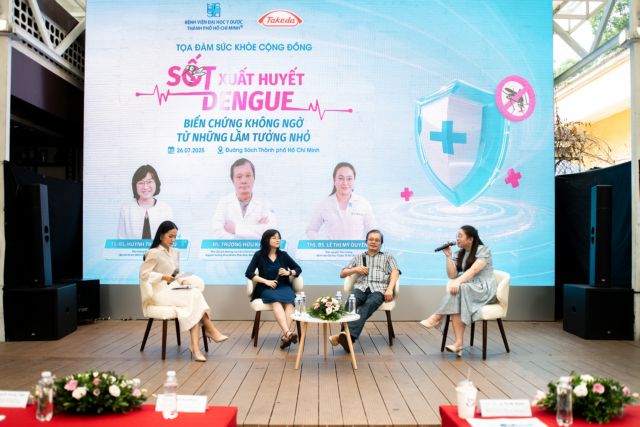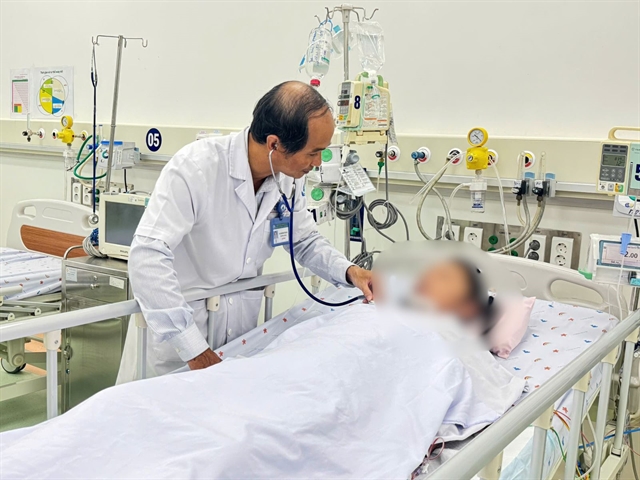 Society
Society


|
| Experts share information about dengue fever at a seminar entitled “Dengue fever: Unexpected complications from common misconceptions” in HCM City on Saturday. – Photo Courtesy of seminar organisers |
HCM CITY – Proactive prevention remains an effective and sustainable measure in combating dengue fever and reducing its impact on both society in general and the healthcare sector in particular, experts said at a recent seminar entitled “Dengue fever: Unexpected complications from common misconceptions”.
Jointly organsied by the University Medical Centre, HCM City and Takeda Viet Nam Pharmaceuticals Limited in HCM City late last week, the seminar aimed to raise public awareness regarding the severity of dengue fever and highlight the critical role of proactive disease prevention, especially in the face of increasingly unpredictable outbreaks.
Although efforts to prevent and treat dengue fever in Việt Nam have improved over time, there is still a lack of appropriate knowledge about the disease and its prevention and treatment methods, especially in rural and remote areas, as noted by doctors at the seminar.
According to the HCM City Centre for Disease Control, as of July 13, 2025, HCM City recorded 15,538 cases of dengue fever, marking a significant 159.4 per cent increase compared to the same period in 2024.
Nationwide, the Department of Disease Prevention reported a total of 32,189 dengue fever cases from the beginning of the year until July 8, 2025, with notable increases in various localities.
The Southern region accounted for over 70 per cent of total dengue fever cases in the country as of early July 2025, indicating that the dengue epidemic is no longer seasonal but rather occurring year-round.
There is also a risk of an “overlapping epidemic” involving dengue fever and other infectious diseases due to prolonged rainy and stormy weather in some areas, posing challenges for early diagnosis and proper treatment.
With dengue fever cases on the rise, the disease is impacting society and the healthcare sector significantly, affecting not only children and young adults but also healthy adults and those with underlying conditions like diabetes and hypertension. Severe dengue fever cases in adults often lead to complex disease progressions with severe complications, increasing the risk of death compared to cases in children.
Dr Huỳnh Trung Triệu, vice head of Paediatric ICU at Hospital for Tropical Diseases said: “The cost depends on the length of hospitalisation. On average, patients treated for two weeks in the intensive care unit often incur expenses of around VNĐ150 million [US$5,700] to VNĐ200 million [$7,700]. If the patient suffers from organ damage or secondary infections, the hospital stay may be extended. In addition to bearing high treatment costs, patients also face reduced work capacity and loss of income.”
Beyond the acute treatment phase, dengue fever can leave lasting consequences, affecting patients' physical, mental, and overall quality of life, especially in children. Some children experience prolonged fatigue and neurological issues even after recovery, requiring long-term rehabilitation and specialised care.
It's not just the patients who bear a heavy burden; their families also suffer significantly. Caring for children after treatment requires considerable time, effort, and high costs, while many parents have to take time off work, lose income, or endure prolonged psychological stress. This means dengue fever is not just a medical issue, but also a societal burden if not prevented promptly and effectively.
At the seminar, experts cautioned against common misunderstandings and mishandling of dengue fever. They highlighted the dangers of assuming "mild fever is harmless" and self-medication practices that can worsen the disease, potentially leading to severe complications and death.
Master Dr Lê Thị Mỹ Duyên, from the Vaccination Unit at University Medical Centre, HCM City, shared: “Many children arrive at the hospital already in shock, with liver damage and coagulation disorders, simply because their parents thought they were safe once the fever subsided”.
Dr Trương Hữu Khanh, vice president of the HCM City Infectious Diseases Association and former head of the Department of Infection and Neurology at Children's Hospital 1, HCM City, stated: “Many cases of dengue fever are mistaken for common viral fevers, leading to home treatment without close medical monitoring. This is why patients are hospitalised late and are at risk of severe complications.”
In reality, the fever-reducing phase is the most dangerous if not medically monitored. Obesity and other underlying conditions in general are alarming risk factors, making the disease progression more severe and complex.
Proactive prevention - the key to combating dengue fever
In light of the complex and severe consequences of dengue fever, experts stressed that proactive prevention remains the key to combating the disease effectively. Community health education plays a vital role in ensuring widespread adoption of preventive measures. Individuals are urged to take action in breaking the transmission chain by implementing practical preventive measures such as eliminating mosquito breeding sites and using mosquito nets consistently.

|
| A dengue fever patient at a hospital in HCM City. – Photo from Internet |
Dr Khanh emphasised the active role of individuals in breaking the chain of transmission early: “Dengue prevention cannot solely rely on the healthcare sector. The disease can only truly be controlled when every citizen understands that small actions, like clearing water containers around their homes and sleeping under mosquito nets even during the day, are the most practical ways to protect themselves and prevent the disease from spreading in the community. In addition to these measures, vaccination is also a way to enhance prevention”.
Considering the challenges in dengue fever management, experts emphasised the importance of early detection for high-risk groups and proactive protection for children. They advised parents to recognise early signs of the disease, seek prompt medical attention, and actively participate in mosquito control efforts to safeguard against the long-term impacts of dengue fever.
Vaccination was also emphasised as an effective preventive measure against dengue fever transmission.
Dr Triệu warned about the risk of dengue fever worsening rapidly in adults if detected late: “For high-risk groups [the elderly, pregnant women, those with underlying conditions], dengue fever progresses very quickly and unpredictably, and the hospital stay for physical recovery can be prolonged. Therefore, it is crucial to detect warning signs early and monitor them closely from the first day of illness.”
Dr Duyên urged parents to proactively protect their children: “Dengue fever is not just a fever; if it progresses severely, the disease can leave behind sequelae, affecting a child's development while also imposing a financial and emotional burden on the entire family. In fact, there have been cases where pediatric patients, although cured of dengue fever, continued to suffer from prolonged kidney failure and required regular medical check-ups.
Therefore, parents should be the strongest shield for their children by actively eliminating mosquitoes, recognising early signs of the disease, and taking their children to the hospital promptly. Do not let today's small oversight turn into future regret."
“Dengue fever is transmitted by Aedes mosquitoes. It is important to proactively wear long-sleeved clothing, use mosquito nets both day and night, apply mosquito repellent correctly, control stagnant water around the house, and eliminate mosquito larvae. In addition, vaccination is an effective preventive measure,” she added. – VNS




